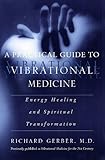Vibrational Medicine is allegedly written by someone with an M.D. With that being so, it wouldn’t be unreasonable to expect that the author had a fair amount of education and was capable of writing a book that while potentially controversial (nothing wrong with that per se) but was supported by real research which, of course, would also be listed in a well-written bibliography. Don’t expect anything like this; however, from Richard Gerber – the guy is a real QUACK!
I originally had high hopes for this book – with the topic being “vibrational medicine” there is an incredible wealth of information on all kinds of related topics – including the complete sound spectrum and the electromagnetic continuum. Obviously an enormous amount of time could be spent on examining readily (and empirically) identifiable uses of such waveforms but that seems to be expecting far too much from Gerber.
Instead of science, Gerber decides to spew forth endless pages of New Age quackery beginning with a seemingly never-ending discourse on chakras and other such garbage. He refers to “research” conducted by clairvoyants, psychics, faith healers, “medical intuitives”, and a whole plethora of other euphemisms as the basis for his drivel. This appears to be designed to legitimize the fact that he can’t support the bizarre ideas he presents.
While one can’t help but wonder if Gerber must have missed his thorazine when he wrote this nonsense, he covers many of the most ridiculous modalities of “healing” but ignores many, many valid ones. For example, Gerber doesn’t even mention the use of sound – a treatment modality that has found uses in essentially every culture and yet he goes into such bizarre topics as long distance “color therapy” where the healer merely “thinks” of a color while projecting his/her healing thought upon a patient who happens to be miles away.
In fact, this book contains so much meaningless tripe that it might be best to sum it up by hypothesizing a visit to Gerber’s “medical” practice. For example: suppose you are in the midst of a massive heart attack. After reading this book, it is easy to imagine that Gerber would tell you that his on-staff “medical intuitive” took the day off in order to find some more snake oil. As a result, he needs to call the psychic hotline first (because he can’t read your aura) and will need the so-called clairvoyant at the other end of the line to bathe you in “indigo” in order to unblock your chakras. Let’s not forget that you will need to be facing west, during your heart attack, and have magnets placed upon your chest as you sniff the essence of dandelions that have been fermented in a green room (shaped like a pyramid, of course).
While there are so many promising approaches to healing that use legitmate techniques for overcoming sickness, books like this do nothing but harm those who are doing real research into alternative medicine modalities. If you have any sense, at all, avoid this unscientific pile of excrement behind … after all, you wouldn’t want to block your chakras!




